当前位置:
X-MOL 学术
›
Polym. Chem.
›
论文详情
Our official English website, www.x-mol.net, welcomes your
feedback! (Note: you will need to create a separate account there.)
Eugenol-based polyester and its bamboo fiber composite with enhanced mechanical and anti-ultraviolet properties
Polymer Chemistry ( IF 4.1 ) Pub Date : 2024-11-12 , DOI: 10.1039/d4py00998c Qiubo Wang, Xinyu Hu, Shuyao Wang, Ruyi Sun, Xiaojuan Liao, Meiran Xie
Polymer Chemistry ( IF 4.1 ) Pub Date : 2024-11-12 , DOI: 10.1039/d4py00998c Qiubo Wang, Xinyu Hu, Shuyao Wang, Ruyi Sun, Xiaojuan Liao, Meiran Xie

|
Eugenol (UG) is a sustainable allyl-substituted guaiacol that easily becomes the monomer for acyclic diene metathesis (ADMET) polymerization. Nevertheless, ADMET polymers usually have a moderate molecular weight and poor mechanical properties, which cannot meet the demand of daily use. Herein, UG is used as the starting material for polymerization and modification of polymers, aiming at improving the mechanical properties of UG-based polymers and realizing their functional application. A class of biobased unsaturated polyesters was prepared by ADMET polymerization of α,ω-dienes derived from UG bearing an allyl group, and the UG-based polyesters showed improved intrinsic anti-ultraviolet (UV) performance with a UV protection factor (UPF) ranging from 10.9 to 48.2 compared with furan-based ADMET polyesters. Meanwhile, UG was used as a comonomer to undergo inverse vulcanization with elemental sulfur, affording a novel polysulfide as the crosslinking agent. By adding raw bamboo fiber, the obtained polymer composite with enhanced mechanical properties and reprocessability exhibited excellent anti-UV performance with a superior UPF of 252 and could almost maintain its original mechanical properties and UV protection ability even after prolonged exposure to UV light. This work provided an effective approach for preparing renewable functional polyesters and plant fiber-toughening polymer composites with an expanded application field.
中文翻译:

丁香酚基聚酯及其竹纤维复合材料,具有增强的机械和抗紫外线性能
丁香酚 (UG) 是一种可持续的烯丙基取代愈创木酚,很容易成为无环二烯复分解 (ADMET) 聚合的单体。然而,ADMET 聚合物通常分子量适中,机械性能差,无法满足日常使用的需求。在此,UG 用作聚合物聚合和改性的起始材料,旨在改善 UG 基聚合物的机械性能并实现其功能应用。通过对带有烯丙基的 UG 衍生的 α,ω-二烯进行 ADMET 聚合制备了一类生物基不饱和聚酯,与呋喃基 ADMET 聚酯相比,UG 基聚酯表现出更好的本征抗紫外线 (UV) 性能,紫外线防护系数 (UPF) 为 10.9 至 48.2。同时,以 UG 为共聚单体与元素硫进行逆硫化,得到一种新型多硫化物作为交联剂。通过添加生竹纤维,获得的具有增强机械性能和再加工性的聚合物复合材料表现出优异的抗紫外线性能,具有优异的 UPF 为 252,即使长时间暴露在紫外线下,也几乎可以保持其原有的机械性能和紫外线防护能力。这项工作为制备可再生功能性聚酯和植物纤维增韧聚合物复合材料提供了一种有效的方法,并扩大了应用领域。
更新日期:2024-11-12
中文翻译:

丁香酚基聚酯及其竹纤维复合材料,具有增强的机械和抗紫外线性能
丁香酚 (UG) 是一种可持续的烯丙基取代愈创木酚,很容易成为无环二烯复分解 (ADMET) 聚合的单体。然而,ADMET 聚合物通常分子量适中,机械性能差,无法满足日常使用的需求。在此,UG 用作聚合物聚合和改性的起始材料,旨在改善 UG 基聚合物的机械性能并实现其功能应用。通过对带有烯丙基的 UG 衍生的 α,ω-二烯进行 ADMET 聚合制备了一类生物基不饱和聚酯,与呋喃基 ADMET 聚酯相比,UG 基聚酯表现出更好的本征抗紫外线 (UV) 性能,紫外线防护系数 (UPF) 为 10.9 至 48.2。同时,以 UG 为共聚单体与元素硫进行逆硫化,得到一种新型多硫化物作为交联剂。通过添加生竹纤维,获得的具有增强机械性能和再加工性的聚合物复合材料表现出优异的抗紫外线性能,具有优异的 UPF 为 252,即使长时间暴露在紫外线下,也几乎可以保持其原有的机械性能和紫外线防护能力。这项工作为制备可再生功能性聚酯和植物纤维增韧聚合物复合材料提供了一种有效的方法,并扩大了应用领域。






























 京公网安备 11010802027423号
京公网安备 11010802027423号